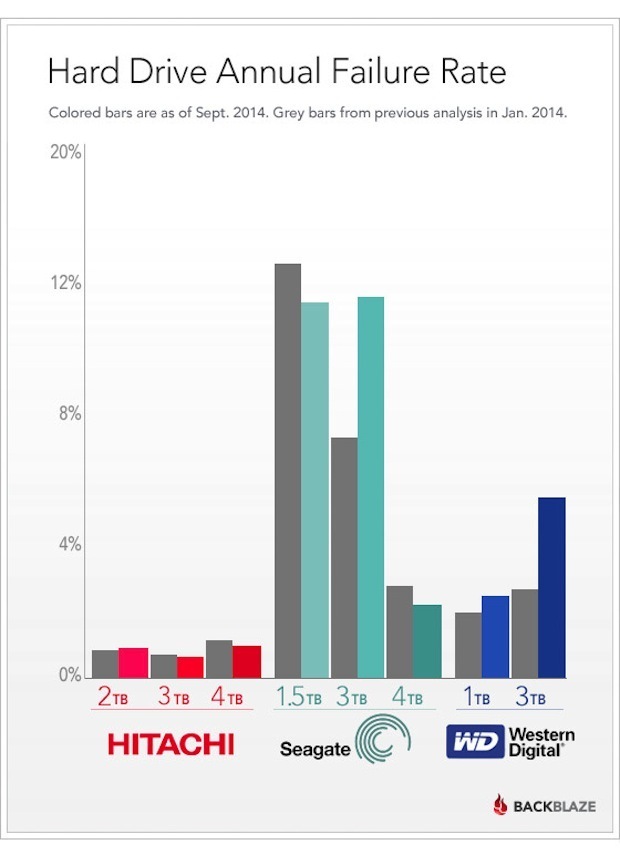Consumer drives shown to be more reliable than enterprise drives
Seagate hard drives fail with more regularity than those from Western Digital or Hitachi, according to the latest results of an ongoing study by cloud service provider Backblaze.
Backblaze released data from 38,000 drives that store more than 100 petabytes in its data center. The research continued to show consumer drives had the same or better reliability compared with more costly enterprise-class drives.
Backblaze CEO Gleb Budman said enterprise drives also cost “over 2x more than a consumer drive” so that purchasing the costlier drives even if they did fail less often wouldn’t make sense.
“Most of the drives we get have a 3-year warranty, making failures a non-issue from a cost perspective for that period,” a Backblaze blog stated. “However, even if there were no warranty, a 15% annual failure rate on the consumer desktop drive and a 0% failure rate on the enterprise drive, the breakeven would be 10 years, which is longer than we expect to even run the drives for.”
The service provider noted that on Amazon, a Seagate 3TB enterprise drive is priced at $235 compared with its 3TB desktop drive, which sells for $102.
“The assumption that enterprise drives would work better than consumer drives has not been true in our tests,” the company stated in a blog post. “I analyzed both of these types of drives in our system and found that their failure rates in our environment were very similar — with the consumer drives actually being slightly more reliable.”
This is the third time Backblaze has released data about annual drive failure rates in its data center. The latest results use data from 38,000 drives compared with its previous study, from January, that used 27,000.
Seagate 3.0 TB drives break down more, with their failure rate jumping from 9% to 15%. The Western Digital 3TB drives have also failed more, with their rate rising from 4% to 7%.
Last year, the company released the first batch of data showing that nearly one out of four (22%) of more than 25,000 consumer-grade hard drives died in their first four years of use.
Most of the drives Backblaze uses are consumer drives with a three-year warranty, “making failures a non-issue from a cost perspective for that period.”
The latest findings show drives from Hitachi (HGST) were more reliable than Seagate or Western Digital models.
For example, Seagate’s Barracuda 7200.11 1.5TB desktop hard drive that was on average 4.3 years old, had an annual failure rate of 24.9%. Those were, however, the oldest drives listed by Backblaze.
Conversely, Hitachi Deskstar 7K2000 2TB hard drives that were on average 3.4 years old had an annual failure rate of only 1.1%, that data revealed.
Western Digital Red 3TB drives, with an average age of half a year, had a failure rate of 8.8%. Meanwhile, Western Digital Caviar Green 1TB drives with an average 4.6 year age only had a 3.8% annual failure rate.
“The surprising (and bad) news is that Seagate 3.0TB drives are failing a lot more, with their failure rate jumping from 9% to 15%. The Western Digital 3TB drives have also failed more, with their rate going up from 4% to 7%,” the blog stated.
Hitachi drives, the Seagate 1.5 TB and 4TB drives and Western Digital 1TB drives continued to perform well, Backblaze said, but the Seagate and Western Digital 3.0 TB drives failure rates are up quite a bit.
For example, Seagate’s Barracuda 7200.14 3TB hard drives with an average 1.9-year lifespan had a 15.7% annual failure rate.
“We use two different models of Seagate 3TB drives. The Barracuda 7200.14 is having problems, but the Barracuda XT is doing well with less than half the failure rate,” Backblaze stated.
Best comptia A+ Training, Comptia A+ Certification at Certkingdom.com

